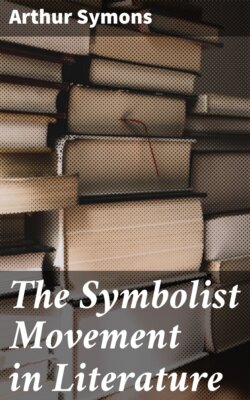Читать книгу The Symbolist Movement in Literature - Symons Arthur - Страница 10
На сайте Литреса книга снята с продажи.
6
ОглавлениеThe life of Balzac was one long labour, in which time, money, and circumstances were all against him. In 1835 he writes: "I have lately spent twenty-six days in my study without leaving it. I took the air only at that window which dominates Paris, which I mean to dominate." And he exults in the labour: "If there is any glory in that, I alone could accomplish such a feat." He symbolises the course of his life in comparing it to the sea beating against a rock: "To-day one flood, to-morrow another, bears me along with it. I am dashed against a rock, I recover myself and go on to another reef." "Sometimes it seems to me that my brain is on fire. I shall die in the trenches of the intellect."
Balzac, like Scott, died under the weight of his debts; and it would seem, if one took him at his word, that the whole of the Human Comedy was written for money. In the modern world, as he himself realised more clearly than any one, money is more often a symbol than an entity, and it can be the symbol of every desire. For Balzac money was the key of his earthly paradise. It meant leisure to visit the woman whom he loved, and at the end it meant the possibility of marrying her.
There were only two women in Balzac's life: one, a woman much older than himself, of whom he wrote, on her death, to the other: "She was a mother, a friend, a family, a companion, a counsel, she made the writer, she consoled the young man, she formed his taste, she wept like a sister, she laughed, she came every day, like a healing slumber, to put sorrow to sleep." The other was Mme. de Hanska, whom he married in 1850, three months before his death. He had loved her for twenty years; she was married, and lived in Poland; it was only at rare intervals that he was able to see her, and then very briefly; but his letters to her, published since his death, are a simple, perfectly individual, daily record of a great passion. For twenty years he existed on a divine certainty without a future, and almost without a present. But we see the force of that sentiment passing into his work; Séraphita is its ecstasy, everywhere is its human shadow; it refines his strength, it gives him surprising intuitions, it gives him all that was wanting to his genius. Mme. de Hanska is the heroine of the Human Comedy, as Beatrice is the heroine of the Divine Comedy.
A great lover, to whom love, as well as every other passion and the whole visible world, was an idea, a flaming spiritual perception, Balzac enjoyed the vast happiness of the idealist. Contentedly, joyously, he sacrificed every petty enjoyment to the idea of love, the idea of fame, and to that need of the organism to exercise its forces, which is the only definition of genius. I do not know, among the lives of men of letters, a life better filled, or more appropriate. A young man who, for a short time, was his secretary, declared: "I would not live your life for the fame of Napoleon and of Byron combined!" The Comte de Gramont did not realise, as the world in general does not realise, that, to the man of creative energy, creation is at once a necessity and a joy, and to the lover, hope in absence is the elixir of life. Balzac tasted more than all earthly pleasures as he sat there in his attic, creating the world over again, that he might lay it at the feet of a woman. Certainly to him there was no tedium in life, for there was no hour without its vivid employment, and no moment in which to perceive the most desolate of all certainties, that hope is in the past. His death was as fortunate as his life; he died at the height of his powers, at the height of his fame, at the moment of the fulfilment of his happiness, and perhaps of the too sudden relief of that delicate burden.
1899.
